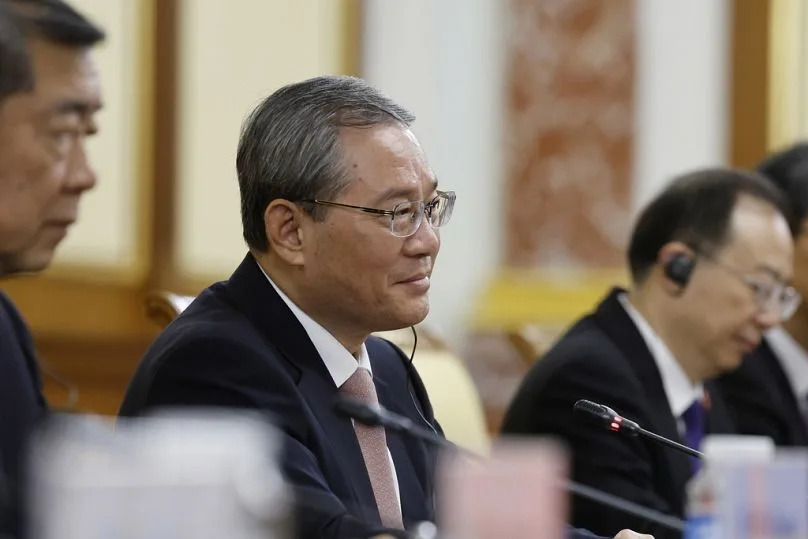China, Russia plot course for Arctic cooperation, shipping routes to counter West

China and Russia have edged closer to a deal on shipping routes in the Arctic, with both countries looking to expand economic cooperation to counter Western pressure.
In Moscow on Wednesday, Chinese Premier Li Qiang and his Russian counterpart Mikhail Mishustin signed a joint communique agreeing to develop shipping routes in the Arctic under a consensus reached in May in Beijing between the presidents of the two countries.
It was part of a bigger pledge that their nations would consolidate traditional partnerships in oil and gas production while developing cooperation in emerging sectors such as science and technology and the digital economy.
The communique stressed that "consolidating China-Russia relations is a strategic choice made by both sides based on the broad common fundamental interests of the two countries and their peoples, and is not affected by changes in the international situation".

Chinese Premier Li Qiang (left) and Russian Prime Minister Mikhail Mishustin shake hands during a signing ceremony in Moscow on Wednesday.
"Both sides resolutely defend their legitimate rights and interests and oppose any attempt to obstruct the normal development of bilateral relations, interfere in the internal affairs of the two countries, and restrict the economic, technological and international space of the two countries."
In the communique, both sides also pledged support for their mutual sovereignty. While Russia said it opposed any form of independence for Taiwan, Beijing said it supported Russia's territorial integrity.
Li is visiting Russia for the annual meeting between the two heads of government before travelling to Belarus. He was also received by Russian President Vladimir Putin on Wednesday.
The meeting came as both China and Russia seek to make their economies more resilient in the face of Western pressure over Beijing's growing international influence and Russia's invasion of Ukraine.
Russia has increasingly looked to China to help develop an Arctic sea route that could cut its shipping time to Asia by almost half, as the sanctions-hit economy continues to rely heavily on its Asian trade partners.
Beijing has maintained close trade ties with Moscow during the war, with several Chinese companies being sanctioned by the US and Europe for allegedly transferring dual-use goods that have strengthened Russia's defence base.
Both sides condemned "unilateral" sanctions, and vowed to expand mutual use of their own currencies in trade, which stood at 95 per cent of transactions. The two countries would also push for institutional reform of the Bretton Woods system, aiming to further reduce the dominance of the US dollar, the document said.
Amid Western sanctions that have largely hit Russian gas supplies to Europe, Moscow has also looked to accelerate the construction of the controversial Power of Siberia 2 natural gas pipeline, which would cross Mongolia between China and Russia. Progress has reportedly slowed due to disagreements over pricing. Mongolia's recent removal of the project from its 2028 development plan has also cast further uncertainty about the pipeline.
Without mentioning the pipeline, Beijing and Moscow said in the joint communique that they would work to implement key cooperation projects and tasks under the China-Mongolia-Russia Economic Corridor.
The two also agreed to continue to engage in "constructive dialogue" about allowing Chinese cargo ships through the lower Tumen River, a key waterway between China, Russia and North Korea that would give Beijing access to the Sea of Japan, or East Sea.
Russia and North Korea were believed to be hesitant about opening the waterway for Beijing, worrying that it could further expand its influence in the region. Relations between Moscow and Pyongyang have grown closer after Pyongyang allegedly provided weapons for Russia's war in Ukraine.
Beijing is thought to be wary about being drawn into a trilateral axis with Russia and North Korea as it remains engaged with Western countries, which view alliances between the three nations as potential threats.
On Tuesday, The New York Times reported that US President Joe Biden had ordered US forces to prepare for possible coordinated nuclear confrontations with Russia, China and North Korea over their nuclear capabilities. In response, Beijing criticised Washington for being the world's "biggest creator of nuclear threats".
Mishustin and Li also signed a protocol for the Chinese Ministry of Science and Technology and the Russian Joint Institute for Nuclear Research to jointly fund cooperative research projects.
While meeting with Putin, Li said China would work with Russia to develop more cooperation opportunities in the fields of science and technology.
"China is willing to work with Russia ... to pay more attention to using scientific and technological innovation and industrial innovation to drive cooperation, and constantly cultivate new economic growth points," Li said.
AfriPrime App link: FREE to download...
https://www.amazon.com/Africircle-AfriPrime/dp/B0D2M3F2JT
Chinese premier hails trade relations with Vladimir Putin in Moscow
Russian President Vladimir Putin met with Chinese premier Li Qiang on Wednesday, hailing growing trade relations as Moscow becomes increasingly dependent on Beijing for political and economic support.
“Our trade relations are developing successfully. The attention that the governments of the two countries on both sides are paying to trade and economic ties is yielding results,” Putin said at the meeting in the Kremlin.
He also said that Russia and China have developed “large-scale plans” for economic and other projects.

“Chinese-Russian relations are at an unprecedentedly high level," said Li, who earlier had met with his Russian counterpart, Prime Minister Mikhail Mishustin.
The meeting took place as Russia struggles to push back a Ukrainian incursion into the Kursk region now in its third week. And overnight, Moscow experienced one of the largest waves of drone attacks on the Russian capital since the start of the Ukraine conflict.
Russian news reports did not indicate whether Putin and Li discussed Ukraine.
China has tried to position itself as neutral in the Ukraine conflict, but it shares with Russia high animosity toward the West.
After Western countries imposed heavy sanctions on Russian oil in response to Russia sending troops into Ukraine in February 2022, China strongly stepped up its purchase of Russian oil, increasing its influence in Russia. Putin underlined the importance of China by meeting in Beijing with Chinese leader Xi Jinping soon after being inaugurated for a fifth term in the Kremlin.
A US intelligence assessment released this year indicates that China has significantly increased sales to Russia of machine tools, microelectronics and other technology Moscow uses to produce missiles, tanks, aircraft and other weaponry.
AfriPrime App link: FREE to download...
https://www.amazon.com/Africircle-AfriPrime/dp/B0D2M3F2JT
China, Belarus agree to strengthen cooperation in trade, security
Belarusian President Alexander Lukashenko meets with China's Premier Li Qiang in Minsk.
China and Belarus have agreed to strengthen cooperation in a range of sectors including trade, security, energy and finance, according to a joint statement, after Chinese Premier Li Qiang met Belarusian Prime Minister Roman Golovchenko in Minsk.
The statement released on Friday, a day after the Minsk meeting, said both countries would also strengthen cooperation in industrial supply chains and continue to enhance trade facilitation to reduce costs for both ends.
Belarus also intends to deepen cooperation with the Guangdong-Hong Kong-Macau Greater Bay Area, a megalopolis which covers nine cities including Guangzhou, Shenzhen and Zhuhai, said the statement published by China's foreign ministry.
According to the China Daily, Belarus was among the first group of countries that responded to China's Belt and Road Initiative and Li said during his visit to Minsk that China-Belarus relations had remained vibrant for the past 32 years despite the changing international landscape.
China is the second-largest trading partner of Belarus and its largest trading partner in Asia, with bilateral trade exceeding $8.4 billion last year, said the China Daily.
Li arrived in Belarus on Thursday after wrapping up his first visit to Russia as Chinese premier.
AfriPrime App link: FREE to download...
- Questions and Answers
- Opinion
- Story/Motivational/Inspiring
- Technology
- Art
- Causes
- Crafts
- Dance
- Drinks
- Film/Movie
- Fitness
- Food
- الألعاب
- Gardening
- Health
- الرئيسية
- Literature
- Music
- Networking
- أخرى
- Party
- Religion
- Shopping
- Sports
- Theater
- Wellness
- News
- Culture
- War machines and policy



